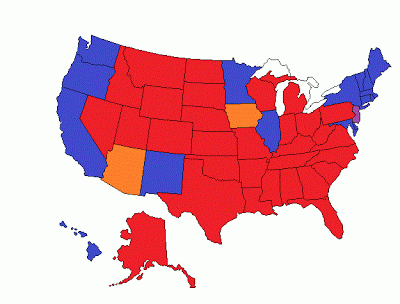The Republicans seem determined to make sure the Democrats
continue to control the Senate. At the moment Democrats have 51 seats,
Republicans 47 seats and there are two independents who caucus with the
Democrats. At the start of this year it looked like the Republicans were going
to win back the Senate. Since then things have changed.
In North Dakota and Nebraska the Democratic senators decided
to retire, many viewed this as an easy opportunity for the Republicans to flip
both seats from blue to red. In Missouri, the incumbent Democrat Claire
McCaskill was becoming increasingly unpopular. Scott Brown is the Republican
senator for Massachusetts; it was believed that he had a strong chance to keep
his seat considering his moderate credentials.
Republicans were also expected to put up strong performances in
Wisconsin (where the current Senator is retiring) as well as Pennsylvania,
Ohio, Montana and Connecticut, all these states currently have Democratic
senators. Indiana was regarded as safely Republican due to the extremely
popular Richard Lugar; in fact he is so popular in the state that in his last
re-election in 2006, the Democrats didn’t even bother to run an opponent. The
only disappointing news before the primary season began was the when Olympia
Snowe announced her retirement, Snowe represents liberal Maine; her retirement
gave Democrats a chance to flip her seat.
Despite all indicators pointing to a return to a Republican
majority in the Senate, things have gone less well for the Republicans in 2012;
much of this damage was self-inflicted. In Missouri they chose the weakest
candidate available, Todd Akin, and in Indiana they chucked out the popular
Richard Lugar and replaced him with a Tea Party radical. Although Nebraska is
certainly going to the Republicans, North Dakota has been surprisingly
competitive with the Republican, Rick Berg basically tying Democrat, Heidi
Heitkamp in most polls. Republicans have also been disappointed with their
candidates’ performances in Wisconsin, Connecticut, Ohio and Pennsylvania; all
four states are likely to remain Democratic. There is bad news in Maine for the
Republicans and Democrats, currently an independent candidate, Angus King, is leading
both parties by up to 20 points. Although this may appear bad on the surface
for both parties, it is a lot worse for the Republicans; the seat is currently
held by a Republican and King is expected to caucus with the Democrats for
Senate leadership.
There are a few states that need looked at specifically; Massachusetts,
Missouri and Indiana. Of those three states, by far the most liberal is Massachusetts;
in 2010 Scott Brown was elected senator in a special election to replace the
recently deceased, Ted Kennedy. It was expected that he would experience a
struggle to hold on to his seat, yet for most of the year he was ahead in the
polls. He has attempted to portray himself as a moderate, he has distanced
himself from much of the Republican leadership and was one of the first
Republicans to condemn Todd Akin after his rape comments. In recent weeks his
lead has completely evaporated and his Democratic challenger, Elizabeth Warren
is leading by good margins. Part of this
can be placed on the perceived racism of his campaign, against Native
Americans. Warren has Native American blood in her, yet Brown claims that this
is not possible! Just look at her, she’s clearly white! Since then a number of Brown staffers have
been seen making fun of Native Americans, something that has not gone down well
with Massachusetts voters.
In Missouri, the Republicans were expecting to beat the
unpopular Democratic incumbent, Claire McCaskill. This was, of course, before Todd
Akin got himself mired in scandal. Akin was leading in every poll, until he
went on TV and said the following on the issue of women getting pregnant as a
result of being raped and whether they should be allowed an abortion:
“If it’s a legitimate rape, then the female body has ways to try to shut
that whole thing down.”
Naturally this caused a major up-roar across the US, Republicans
across the country called for him to quit the race. He did not, since then he
has trailed McCaskill in the polls by 7%.
Todd Akin isn’t the only candidate to ruin his chances due to
his stance on abortion, in Indiana Richard Mourdock said the following in a
recent TV debate:
“Even if life begins in that horrible situation of rape, that is
something God intended to happen.”
Shocking right? Implying that God intended a woman to be
raped is never a good thing to say, regardless of what your views on abortion
are. In an attempt to salvage his election chances, Mourdock later tried to
clarify what he meant by that comment saying that God didn’t intend the rape to
happen, but whilst you were being raped God decided to give you the ‘gift’ of
life. That, naturally, just made things worse.
With the Presidential race as close as it is and the
Republicans likely to keep the House, the Democrats can at least take comfort
knowing they will likely keep the Senate. If you look at the poll averages over
on the Huffington Post, you can clearly see that the Senate races are going the
Democrats’ way. If each state that is
deemed lean or strong Democrat votes Democrat and every state that is deemed lean
or strong Republican votes Republican, then the Democrats have 50 seats and the
Republicans have 43. This leaves one independent and six seats that could still
go either way. Since polling is sparser in Senate races, Indiana is still
deemed tossup but we should expect Donnelly to win this seat with relative
ease. The other tossup races are Nevada, North Dakota, Arizona, Virginia and
Montana; even if all these states vote against the Democrats it would not be
enough for the Republicans to control the house.






